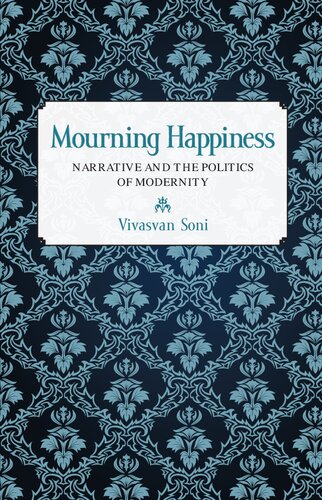

Most ebook files are in PDF format, so you can easily read them using various software such as Foxit Reader or directly on the Google Chrome browser.
Some ebook files are released by publishers in other formats such as .awz, .mobi, .epub, .fb2, etc. You may need to install specific software to read these formats on mobile/PC, such as Calibre.
Please read the tutorial at this link: https://ebookbell.com/faq
We offer FREE conversion to the popular formats you request; however, this may take some time. Therefore, right after payment, please email us, and we will try to provide the service as quickly as possible.
For some exceptional file formats or broken links (if any), please refrain from opening any disputes. Instead, email us first, and we will try to assist within a maximum of 6 hours.
EbookBell Team

4.0
96 reviewsFor many eighteenth-century thinkers, happiness was a revolutionary idea filled with the promise of the Enlightenment. Vivasvan Soni argues, however, that the period fails to establish the importance of happiness as a guiding idea for human practice, generating our modern sentimental idea of happiness. Mourning Happiness shows how the eighteenth century's very obsession with happiness culminates in the political obsolescence of the idea. Soni explains that this puzzling phenomenon can only be comprehended by studying a structural transformation of the idea of happiness at the level of narrative form. Happiness is stripped of its ethical and political content, Soni demonstrates, when its intimate relation to narrative is destroyed. This occurs, paradoxically, in some of the most characteristic narratives of the period: such eighteenth-century novels as Pamela, The Vicar of Wakefield, and Julie; the pervasive sentimentalism of the time; Kant's ethics; and the political thought of Rousseau and Jefferson.
For Soni, the classical Greek idea of happiness―epitomized by Solon's proverb "Call no man happy until he is dead"―opens the way to imagining a properly secular conception of happiness, one that respects human finitude and mortality. By analyzing the story of Solon's encounter with Croesus, Attic funeral orations, Greek tragedy, and Aristotle's ethics, Soni explains what it means to think, rather than feel, a happiness available for public judgment, rooted in narrative, unimaginable without a relationship to community, and irreducible to an emotional state. Such an ideal, Soni concludes, would allow for a radical reenvisioning of a politics that takes happiness seriously and responds to our highest aspirations rather than merely keeping our basest motivations in check.